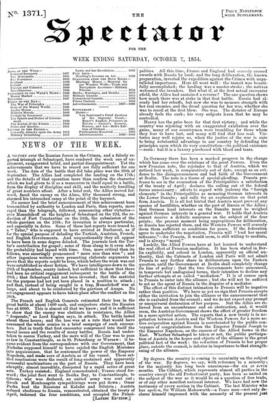In Germany there has been a marked progress in the
change which has come over the relations of the great Powers. Even the new Prussian note, the rejoinder to that of Austria, which we noticed last week, is comparatively out of date, except as an evi- dence to the disingenuousness and bad faith of the Government at Berlin. The note is a tissue of special-pleading. Prussia pro- fesses to see in the evacuation of the Principalities a satisfaction of the treaty of April; declares the calling out of the federal forces unnecessary ; affects to regard with jealousy the " foreith elements" in the Principalities as menacing German interests in the Lower Danube ; and calls for an explanation on that point from Austria. It is all but hinted that Austria must prevent any species of hostilities, whether on the part of Russia or the Allies that German local interests on the Danube must be weighed against German interests in a general war. It holds that Austria cannot receive a definite assurance on the subject of the four points ; the present moment being unpropitious for deliberation, as Russia has rejected them, and the Western Powers will scarcely deem them sufficient as conditions for peace. If the federation agree to undertake the negotiation, Prussia will " lend her moral influence,"—for Prussia, it would seem, is still willing to mediate, and is always " moral." Luckily, the Allied Powers have at last learned to understand the real effect of Prussian mediation. It has been stated in Ber- lin explicitly, and echoed in London, apparently on official au- thority, that the Cabinets of London and Paris will not admit Prussia to any further share in deliberations upon the Eastern question, until the Government at Berlin shall completely change its line of policy : that the two Governments have announced, in temperate but undisguised terms, their intention to decline any further attempts at so called " mediation." It is of course open to Prussia to enter into the alliance ; but she will not be suffered to act as the agent of Russia in the disguise of a mediator.
The effect of this distinct intimation to Prussia will be negative rather than positive. We have as yet no sign that Prussia accepts either the invitation to join the alliance or the announcement that she is excluded from the council; and we do not expect any prompt or unequivocal declaration of her purpose. But the Allies are re- lieved from an encumbrance and an obstruction, and, it would seem, the Austrian Government shows the effect of greater freedom in a more spirited action. The reports that a new treaty is in ne- gotiation between Austria and the Western Powers for a more ac- tive cooperation against Russia is corroborated by the public con- veyance of congratulations from the Emperor Francis Joseph to the Emperor Napoleon, on the success of the Allied forees in the East. Whether Sebastopol be taken or not, the public participa- tion of Austria in the hopes and objects of the alliance is the great political fact of the week : the reduction of Prussia to her proper place, outside the council, is inferior in importance to that strength- ening of the alliance.


































